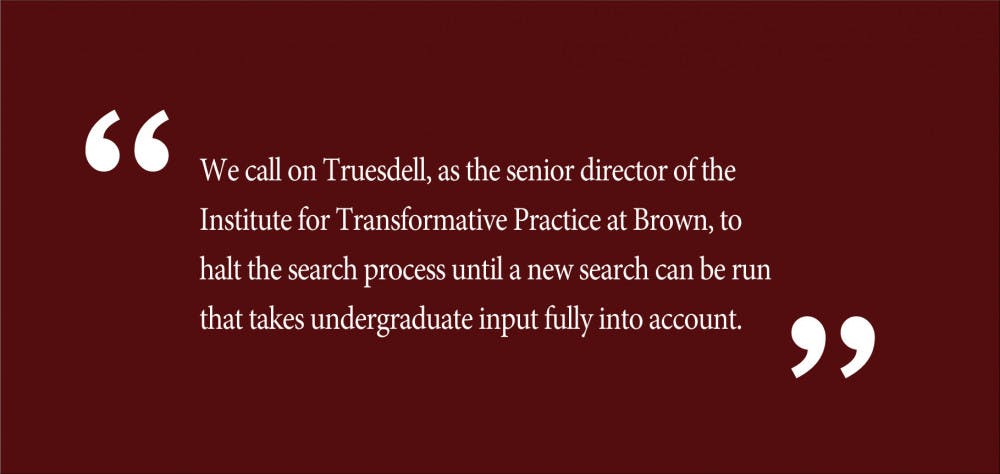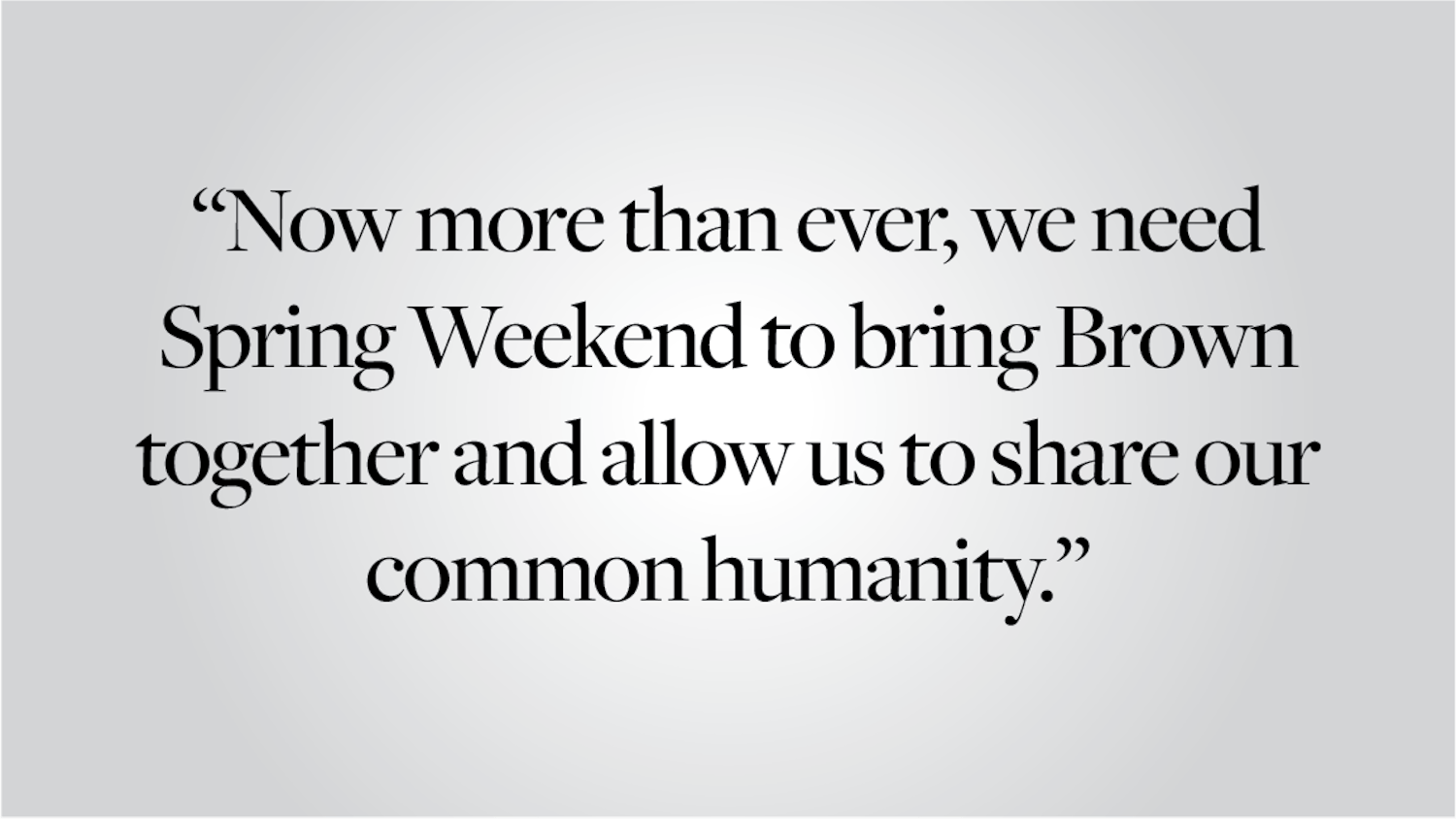Over the summer, the director of the Brown Center for Students of Color was terminated. This came with very little warning to students, who were away from campus and received no official announcement of his termination.
Since July, a search committee has been working to find a replacement director for the BCSC. We have learned that the search committee has chosen three candidates for the position from the pool of applicants, who are scheduled to visit campus between Oct. 7 and 10 in order to meet with students, staff, alumni and faculty. However, given the degree to which the search committee and hiring process has disregarded input from undergraduate students, we believe that the search cannot continue as is. We write as undergraduates deeply invested in the BCSC — one of us is the sole undergraduate member of the search committee — to urge Assistant Vice President Nicole Truesdell to halt the search because it has been conducted on flawed procedural grounds.
The BCSC Diversity and Inclusion Action Plan requires that half of all search committees for Center staff be comprised of students. The search committee for a new BCSC director was formed in the middle of the summer, when students were away from campus and without an official announcement about the director vacancy communicated to the student body. The search committee initially consisted of two administrators, including Truesdell, one staff member, one faculty member, one graduate student and two undergraduate students. By July 24, the faculty member had left the committee; by Sept. 12, one of the undergraduate students had left the committee as well. Now, the undergraduate representation is one out of five people, and there has been no attempt that we are aware of to find faculty members or undergraduates to replace those who left.
We have now repeatedly voiced our frustration with the process, and yet we still feel unheard. On Sept. 19, Truesdell held a town hall to discuss the direction of the Center — including the ongoing search for a replacement director of the BCSC — and to gather student input. Undergraduate students, graduate students, staff and faculty all attended. Students expressed confusion and frustration over the sudden termination of the former BCSC director, and urged Truesdell to restart the search process. Among these students was May Niiya ’20, the remaining undergraduate representative on the search committee and a co-writer of this op-ed. She addressed Truesdell and said: “I haven’t been feeling heard at all… I don’t feel like my feedback has been adequately taken into account at many stages of the search process. I feel really alone when I’m in the search committee with you and a group of administrators and one grad student, and I’m advocating for people that I care about and I’m the only person. It’s really really scary.”
Though it’s important to have representation from all groups of campus life when making such a significant decision about the future of BCSC, the role of undergraduate students in the BCSC cannot be overstated. It is unacceptable to have only one undergraduate on a search committee where decisions are primarily made by majority vote. The BCSC typically hires around 80-90 undergraduate students as staff each year who report directly to professional staff, and these students plan the majority of Center programming and play a key role in Center outreach to the rest of the student body. For example, students help run BCSC’s largest program of the year, the Third World Transition Program, which is a pre-orientation program for first-years entering Brown. Many TWTP participants go on to attend year-round programming and become staffers at the Center themselves.
For students who are often leaving home and entering a predominantly white institution for the first time, the Center is a crucial refuge and community; relationships with professional staff play a huge role in creating such an environment. Most of the people hit hardest by the former director’s sudden termination are undergraduates: We did not get to say goodbye to someone we worked under and had close relationships to. This makes it especially hurtful that the search committee for the former director’s replacement has proceeded without meaningful consideration of our input. Several undergraduate students who we spoke to, many of whom have been deeply involved in the BCSC throughout their time at Brown, did not even find out about the former director’s termination until shortly before the town hall.
The climate of distrust that has resulted from the sudden absence of a beloved staff member makes hiring a replacement at this time a poor decision that will have long-term ramifications for the Center and the crucial function it serves as a home for students of color. “If someone is selected out of this search committee, out of this atmosphere of distrust that you just spoke to, that person will be under the same level of scrutiny and distrust that is being aired throughout this meeting,” said Kuno Haimbodi ‘22 at the town hall. “I don’t think that’s fair to students and people who are going to rely on that person and who are going to need a level of comfort and vulnerability to be able to share for that to be a productive and creative space. This process has not been just. It has not been fair, it has not been accountable – so we cannot expect the product to be one that we can look to for support and for comfort.”
Loretta Eboigbe ’20 voiced similar concerns about distrust within the undergraduate student body. “Replacement without closure is erasure,” she powerfully articulated. “That’s important in this space where people of color are constantly being erased, constantly being made to disappear. What Kuno said is really important to think about — introducing someone into this space where we’re not ready for that.”
We call on Truesdell, as the senior director of the Institute for Transformative Practice at Brown, to halt the search process until a new search can be run that takes undergraduate input fully into account. Transformative justice requires a commitment to truth-telling, dialogue and building relationships of trust. The lack of transparency about the treatment of a beloved staff member , followed by the hasty search process for a replacement in which the lone undergraduate voice felt continually dismissed, have made it very difficult for us to trust the process and to trust that our administrators have our best interests in mind.
Bringing a new director into the Center when these relationships of trust have been deeply damaged will only further alienate students. The Center does need a director, but it would make more sense for a current university staff or faculty member to serve as interim director before the Center designs an inclusive search committee — as opposed to introducing an entirely new person selected through a flawed and unjust process. We say this as students of color who have called the BCSC home for years, and who are committed to ensuring that it can remain a home for generations of students of color to come.
Shivani Guturu '20 can be reached at shivani_guturu@brown.edu, Jessica Jiang '20.5 can be reached at jessica_jiang@brown.edu and May Niiya '20 can be reached at may_niya@brown.edu





